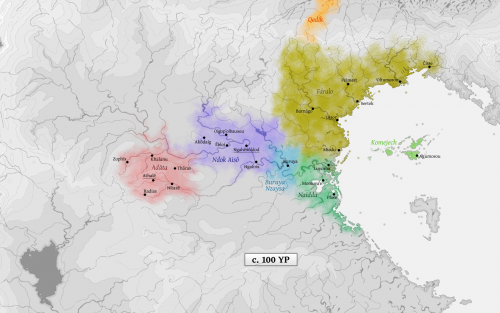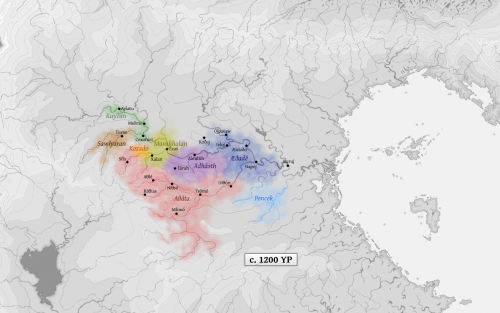Adāta
| Adāta [ˈa.daː.ta] | |
| Period | c. 0-200 YP |
| Spoken in | Rathedān |
| Total speakers | c. 3.5 million |
| Writing system | adapted Tjakori script |
| Classification | Edastean Dāiadak Adāta |
| Typology | |
| Basic word order | SVO |
| Morphology | isolating w/ some fusion |
| Alignment | NOM-ACC |
| Credits | |
| Created by | Dewrad |
Classical Adāta was spoken in the Dāiadak city states of the Rathedān highlands in the time period around 0 YP. With the expansion of the Empire of Athalē from 200 YP onward, the language spread across most of the middle and upper Eigə valley. In 414 YP, Imperial Adāta was declared official language of the empire by Khepōnon I, thereby further strengthening its position outside the Dāiadak heartlands and largely replacing local tongues such as Ndok Aisô and Ktacwa.
Genealogy
Adāta is descended from the southwestern dialects of Ndak Ta, forming part of the Edastean language family, which in turn belongs to the Talo-Edastean subbranch of the Macro-Edastean family. Sister languages of Adāta include Fáralo, Naidda, and Ndok Aisô (listed in decreasing order of historical significance but increasing closeness to Adāta).
- Proto-Macro-Edastean (c. -4000 YP)
- Proto-Talo-Edastean (c. -2500 YP)
- Edastean languages
- Andaggic languages
- Talo languages
- Xoronic languages
- Proto-Talo-Edastean (c. -2500 YP)
Descendants
Adāta is the ancestor of the Dāiadak branch of the Edastean language family. Direct descendants of Adāta were:
- Æðadĕ (Lasomo)
- Aθáta (Rathedān, Milīr valley)
- Adhāsth (Thāraspē)
- Mavakhalan (Khalanu)
- Kuyʔūn (Eiwəl Gourun)
- Kozado (Khalanu)
- Koyek (northwestern Rathedān)
- Pencek (Ici forest)
Sample
- Sinakan, dizaka xezor, dizaka ax las ax Kāxad, mēkat ax Zama on ax Thālo, ro abise sip: Īlanu i ro ape ob ōpākātia ax meze ai, eze dizakalas rūlas ro īr hēkon īla in.
- [ ˈsi.na.kan | ˈdi.za.ka ˈxe.zor | ˈdi.za.ka ax las ax ˈkaː.xad | ˈmeː.kat ax ˈza.ma ɔn ax ˈtʰaː.lo | ro ˈa.bi.se sip ‖ ˈiː.la.nu i ro ˈa.pe ɔb oːˈpaː.kaː.tja ax ˈme.ze aj | ˈe.ze ˈdi.za.ka.las ˈruː.las ro iːr ˈheː.kɔn ˈiː.la in ]
- Sinakan, king great, king of land of Kāxad, brother of Sun and of Moon, AFF say-HAB.SG this.way: before 1SG AFF sit-HAB.SG near throne of father 1SG-POSS, all king.land foreign AFF be-FTL.HAB.SG hostile to 1SG.OBL
(taken from the Tsinakan text)
See also
- Adāta grammar (dating to 130 YP) (backup version of the original description)
- Adāta lexicon (based on the original lexicon file)
- A lexicon of Imperial Adāta c. 400 YP (.csv format)
- Fáralo loanwords relating to imperialism, governance and philosophy (.csv format)
- Sound changes from Ndak Ta to Adāta
- Empire of Athalē

